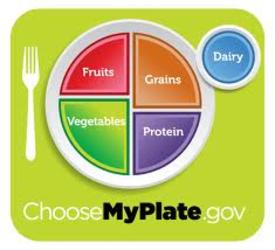Organic -vs- Everything Else??

bbush18
Posts: 207 Member
My hubby and I watched "Food Matters" and "Food, Inc" recently. It's a REAL eye opener. I was just wondering what everyone's opinion is on eating organic and raw.
0
Replies
-
Bump0
-
Eating organic is something that I try to do as much as I can. I shop regularly at Trader Joe's and Sprouts, a farmer's market store. They have a great abundance of these foods. Thanks to watching Food, Inc., I buy organic meats, fruits and vegetables. I feel better when I eat these foods. It's a little more expensive, but in the end, I think it's better putting money towards the food I eat rather than medical bills in the future.0
-
bump0
-
I would love to eat only organic food but it costs too much and I simply can't afford it. I do however practice "clean-eating" as much as possible by eating fresh fruits & vegetables, lean protein and whole grains.0
-
It has changed our life. I posted about this recently also - http://www.myfitnesspal.com/topics/show/235456-consider-the-big-picture0
-
Organic foods often aren't vegan - they use manure from animals instead of a chemical fertilizer. So I'll take a few chemicals.
I'm also not a raw foodist. A lot of the science seems incredibly dubious. One raw foodist told me about how she kept some non-organic apples in the fridge for months, to see what happened. Nothing happened, they looked fine, and she held this up as an example of how unnatural chemicals are on food.
The silly thing? That's what apples do. They keep very well, unless they become bruised or overheated. She had no control for this 'experiment', no organic apple sitting next to the chemical ones.0 -
Eating organic is something that I try to do as much as I can. I shop regularly at Trader Joe's and Sprouts, a farmer's market store. They have a great abundance of these foods. Thanks to watching Food, Inc., I buy organic meats, fruits and vegetables. I feel better when I eat these foods. It's a little more expensive, but in the end, I think it's better putting money towards the food I eat rather than medical bills in the future.
I agree! We've decided to start really watching what we eat. And you're absolutely right--spending more on the right ffods now will DEFINATELY be cheaper than medical bills that could have been avoided in the future.0 -
Organic foods often aren't vegan - they use manure from animals instead of a chemical fertilizer. So I'll take a few chemicals.
Sorry, I'm honestly not trying to poke fun here- I really want to know this. What is the moral basis (if any) for not eating something grown in animal poop?0 -
Our society has become dependent on the low cost of food produced by the food industry. As such, I mean no disparaging remarks towards those that can't afford to spend more on food. But the healthy way to view this is "it costs leas to eat poorly than it does to eat healthy". Other cultures spend a lot more of their income on food than we do in the us and they are healthier as a result.0
-
One very interesting point in "Omnivore's Dilema" is that in the broad scope, it is impossible for us to eat without causing the death of animals. Even if you decide to eat only plants - what happens to the mice, moles, etc. when you plow the earth to plant the food? So, if your interest is to cause the least number of animal deaths, then eat the largest animal that you can grow for food purposes - which would be the cow.0
-
ok, so i'm really trying to understand what the usda deems "organic." to help clarify, what are synthetic pesticides??0
-
i frankly could care less if something is organically grown or not. in some places it's meaningless... oh yeah...it's organic (in that I let it run around my barn and eat whatever it wants) but oh.. my neighbours sprays his fields, and last year I used to do that but I don't this year anymore.
Whereas with others it truly is organic in that... they are surrounded by bush so no overspray happens, they've been a non-spraying, non-chemical using fertilizer user for at least seven years.
Until better legislation is put into place buying organic is a "buyer beware" market.
I can grow my own lettuce, carrots, beans, peas etc. It's relatively organic...but I don't know.. is it truly organic since I fertilize my gardens using rabbit manure and they eat a commercially made pellet. See where it gets sticky?
Unless you grow ALL your own food for your livestock, and produce ALL your own fertilizer how can you truly say that you are really organic and have ZERO overspray from neighbours and have been doing it long enough that all the residues are out of the soil....You can't really say it. Just be alert to what you are truly purchasing.0 -
ladiesown--thanks for the insight!!
 0
0 -
My hubby and I watched "Food Matters" and "Food, Inc" recently. It's a REAL eye opener. I was just wondering what everyone's opinion is on eating organic and raw.
Free range and grass fed beef, pork, poultry, eggs and dairy are non-negotiable. I already felt this way before watching those documentaries. After watching them, it was really reinforced.
As far as fruits and vegetables, nuts, seeds go - I stick with buying organic on the "dirty dozen" which is now the dirty fifteen...... Here is the list that I must buy organic. Everything else is either way depending on our food budget.
12 Most Contaminated
Peaches
Apples
Sweet Bell Peppers
Celery
Nectarines
Strawberries
Cherries
Pears
Grapes (Imported)
Spinach
Lettuce
Potatoes0 -
I definetly try to eat as organic and natural as possible, but it does get quite expensive. I usually just do meat, eggs, soymilk, and fuits and vegetables that have no skin to peel.0
-
I watched it, agreed with it, and then ate some ice cream.
Can't eat organic all the time, hard to shop organically or locally where I live.
I understand the dangers and their reasoning, but as I've said before, there's no escaping toxins and pollution in today's world. I just eat what I can and do what I can to minimize the damage or build myself up to try and combat these harms.0 -
Organic foods often aren't vegan - they use manure from animals instead of a chemical fertilizer. So I'll take a few chemicals.
Sorry, I'm honestly not trying to poke fun here- I really want to know this. What is the moral basis (if any) for not eating something grown in animal poop?
...because it's taken from the same farming industry that gives us dairy, meat, and eggs. If people were wandering around behind wild animals picking it up, that'd be different.0 -
One very interesting point in "Omnivore's Dilema" is that in the broad scope, it is impossible for us to eat without causing the death of animals. Even if you decide to eat only plants - what happens to the mice, moles, etc. when you plow the earth to plant the food? So, if your interest is to cause the least number of animal deaths, then eat the largest animal that you can grow for food purposes - which would be the cow.
What do you think the cow ate? And how do you think they got those plants?
The least number of deaths is caused by eating the plants directly - not growing the plants, feeding them to another animal, and then eating that animal.0 -
To add; 12lbs of grain, 55 square feet of rainforest, and 2500 gallons of water, per 1lb of beef.
You are not seriously suggesting that turning that 12lbs of grain into twenty-four plates of pasta is worse than consuming that, plus 55 square feet of rainforest, plus 2500 gallons of water, plus a cow, are you?0 -
I eat mainly organic foods. I'm also vegan. Aside from my extreme sensitivity to chemicals I would have to imagine the pesticides and herbicides used on crops are also tested on animals. Not to mention that since we have no labeling laws for GMO foods in america the organic label is the only things that will keep that out of your diet. So think again about eating that chemical laden tomato that has been crossed with salmon genes.0
-
Organic foods often aren't vegan - they use manure from animals instead of a chemical fertilizer. So I'll take a few chemicals.
Sorry, I'm honestly not trying to poke fun here- I really want to know this. What is the moral basis (if any) for not eating something grown in animal poop?
...because it's taken from the same farming industry that gives us dairy, meat, and eggs. If people were wandering around behind wild animals picking it up, that'd be different.
What about pesticides that kill insects and runoff into the water table and kill and mutate aquatic life?0 -
Sorry, but you are making a lot of assumptions about how and where I buy my beef. The cows grazed on grass that grew wild and naturally on a sustainable farm using only organic imuts. Grass fed and grass finished. I don't live in a rain forrest.One very interesting point in "Omnivore's Dilema" is that in the broad scope, it is impossible for us to eat without causing the death of animals. Even if you decide to eat only plants - what happens to the mice, moles, etc. when you plow the earth to plant the food? So, if your interest is to cause the least number of animal deaths, then eat the largest animal that you can grow for food purposes - which would be the cow.
What do you think the cow ate? And how do you think they got those plants?
The least number of deaths is caused by eating the plants directly - not growing the plants, feeding them to another animal, and then eating that animal.
I really think we are in agreement about the problem - my solution is to eat only from locally grown, grass fed and grass finished beef.0 -
Can you tell me the name of the farm where the plants were grown that you ate during the past six months?0
-
Sorry, but you are making a lot of assumptions about how and where I buy my beef. The cows grazed on grass that grew wild and naturally on a sustainable farm using only organic imuts. Grass fed and grass finished. I don't live in a rain forrest.
I really think we are in agreement about the problem - my solution is to eat only from locally grown, grass fed and grass finished beef.
I made no assumptions whatsoever about your beef. I didn't say a single word about the beef that you personally buy.
Nor are we in agreement about the problem. I feel that the idea that you have the right to keep another creature in captivity in order to eat it - nevermind the cruelty that most farm animals suffer - is wrong. However 'nice' you are about it, it doesn't change the essence of what you're doing. 'Grass-fed' is as bad as 'free-range' - it makes you feel like you're doing something, absolving you of the effort of actually doing anything (general you, not specific you). I have no clue what you think the problem is (specific you).
However, addressing your idea that grass fed beef results in less deaths than a plant based diet; firstly, the sheer number of cattle raised for beef in the US results in greater soil compaction, which then results in more arid conditions. Plants die, and animals die as their food and habitats are destroyed. Grass-fed cows also release more methane, which increases global warming.
They also require a lot more space, and, due to the infertility of the soil caused by the over compaction, and the issues caused by overgrazing, must be moved relatively often, requiring more space. Yes, this is avoidable with certain farming methods, but not on a large scale. Grass-fed beef is only sustainable if only a few people are eating it. If everyone wanted grass fed beef, in the same amounts that beef is currently consumed, there would be next to no habitats left for other creatures.
The fact that they require more space means that more space must be given over to grassland, which causes problems for local wildlife, and, again, results in the destruction of rainforests. Plus, in some areas, grass is not available through the winter, and they are given hay instead - which has been harvested.Can you tell me the farm where the plants were grown that you ate during the past six months?
Can you explain the relevance of your query?0 -
What about pesticides that kill insects and runoff into the water table and kill and mutate aquatic life?
That's a fair point.0 -
The relevance of the question is that if you can't answer the question then you don't know how your plants were raised and therefore you have no idea how many individual animal lives are taken to produce the plants that you eat or the after effects of any chemicals or methods used.0
-
I'm sorry for being a bit of a jerk; I hate argueing (I'm not sure if you thought it was or not, but it felt like it to me). It makes me crabby; I don't know why I can't just be more polite, and keep my mouth shut sometimes.
It's true, I don't. But, for me personally, it would be difficult to impossible to obtain grass-fed, sustainable, beef, and I'd still feel wrong about eating it if I could. Under these circumstances, eating meat results in more deaths.
Even if I could obtain grass-fed sustainable beef, I'd find it extremely difficult to stick to a fully carnivorous diet, as, I think, most humans would, so I'd still consume some grains and plants. It works out about even to replace each pound of beef I would eat with a pound or fruits, grains and vegetables, since they go much further.0 -
In our house we eat as much organic as possible. I'd rather skip the chemicals & pay a little more. But we do more than just eat organic. We don't use harsh chemical soaps & shampoos, cleaners, cosmetics, etc. We try to buy EVERYTHING as chemical free as possible. Our bodies work hard enough as it is, why make them deal with harmful chemicals, too?0
-
Im sure it is healthier to eat all organic but how does one quantify the way it will improve your health. I'd say it is marginal....at best. I think people blow the reports and evidice against processed food WAY out of proportion.0
This discussion has been closed.
Categories
- All Categories
- 1.4M Health, Wellness and Goals
- 398.2K Introduce Yourself
- 44.7K Getting Started
- 261K Health and Weight Loss
- 176.4K Food and Nutrition
- 47.7K Recipes
- 233K Fitness and Exercise
- 462 Sleep, Mindfulness and Overall Wellness
- 6.5K Goal: Maintaining Weight
- 8.7K Goal: Gaining Weight and Body Building
- 153.5K Motivation and Support
- 8.4K Challenges
- 1.4K Debate Club
- 96.5K Chit-Chat
- 2.6K Fun and Games
- 4.8K MyFitnessPal Information
- 12 News and Announcements
- 21 MyFitnessPal Academy
- 1.6K Feature Suggestions and Ideas
- 3.2K MyFitnessPal Tech Support Questions












